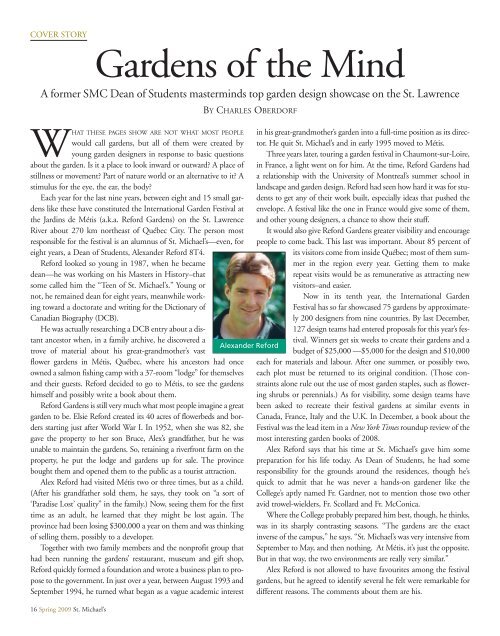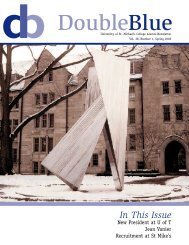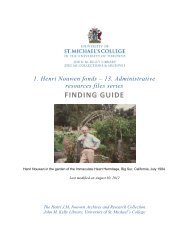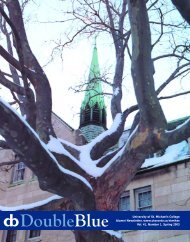gardens of the mind gardens of the mind - St. Michael's College ...
gardens of the mind gardens of the mind - St. Michael's College ...
gardens of the mind gardens of the mind - St. Michael's College ...
You also want an ePaper? Increase the reach of your titles
YUMPU automatically turns print PDFs into web optimized ePapers that Google loves.
COVER STORY<br />
WHAT THESE PAGES SHOW ARE NOT WHAT MOST PEOPLE<br />
would call <strong>gardens</strong>, but all <strong>of</strong> <strong>the</strong>m were created by<br />
young garden designers in response to basic questions<br />
about <strong>the</strong> garden. Is it a place to look inward or outward? A place <strong>of</strong><br />
stillness or movement? Part <strong>of</strong> nature world or an alternative to it? A<br />
stimulus for <strong>the</strong> eye, <strong>the</strong> ear, <strong>the</strong> body?<br />
Each year for <strong>the</strong> last nine years, between eight and 15 small <strong>gardens</strong><br />
like <strong>the</strong>se have constituted <strong>the</strong> International Garden Festival at<br />
<strong>the</strong> Jardins de Métis (a.k.a. Reford Gardens) on <strong>the</strong> <strong>St</strong>. Lawrence<br />
River about 270 km nor<strong>the</strong>ast <strong>of</strong> Québec City. The person most<br />
responsible for <strong>the</strong> festival is an alumnus <strong>of</strong> <strong>St</strong>. Michael’s—even, for<br />
eight years, a Dean <strong>of</strong> <strong>St</strong>udents, Alexander Reford 8T4.<br />
Reford looked so young in 1987, when he became<br />
dean—he was working on his Masters in History–that<br />
some called him <strong>the</strong> “Teen <strong>of</strong> <strong>St</strong>. Michael’s.” Young or<br />
not, he remained dean for eight years, meanwhile working<br />
toward a doctorate and writing for <strong>the</strong> Dictionary <strong>of</strong><br />
Canadian Biography (DCB).<br />
He was actually researching a DCB entry about a distant<br />
ancestor when, in a family archive, he discovered a<br />
trove <strong>of</strong> material about his great-grandmo<strong>the</strong>r’s vast<br />
flower <strong>gardens</strong> in Métis, Québec, where his ancestors had once<br />
owned a salmon fishing camp with a 37-room “lodge” for <strong>the</strong>mselves<br />
and <strong>the</strong>ir guests. Reford decided to go to Métis, to see <strong>the</strong> <strong>gardens</strong><br />
himself and possibly write a book about <strong>the</strong>m.<br />
Reford Gardens is still very much what most people imagine a great<br />
garden to be. Elsie Reford created its 40 acres <strong>of</strong> flowerbeds and borders<br />
starting just after World War I. In 1952, when she was 82, she<br />
gave <strong>the</strong> property to her son Bruce, Alex’s grandfa<strong>the</strong>r, but he was<br />
unable to maintain <strong>the</strong> <strong>gardens</strong>. So, retaining a riverfront farm on <strong>the</strong><br />
property, he put <strong>the</strong> lodge and <strong>gardens</strong> up for sale. The province<br />
bought <strong>the</strong>m and opened <strong>the</strong>m to <strong>the</strong> public as a tourist attraction.<br />
Alex Reford had visited Métis two or three times, but as a child.<br />
(After his grandfa<strong>the</strong>r sold <strong>the</strong>m, he says, <strong>the</strong>y took on “a sort <strong>of</strong><br />
‘Paradise Lost’ quality” in <strong>the</strong> family.) Now, seeing <strong>the</strong>m for <strong>the</strong> first<br />
time as an adult, he learned that <strong>the</strong>y might be lost again. The<br />
province had been losing $300,000 a year on <strong>the</strong>m and was thinking<br />
<strong>of</strong> selling <strong>the</strong>m, possibly to a developer.<br />
Toge<strong>the</strong>r with two family members and <strong>the</strong> nonpr<strong>of</strong>it group that<br />
had been running <strong>the</strong> <strong>gardens</strong>’ restaurant, museum and gift shop,<br />
Reford quickly formed a foundation and wrote a business plan to propose<br />
to <strong>the</strong> government. In just over a year, between August 1993 and<br />
September 1994, he turned what began as a vague academic interest<br />
16 Spring 2009 <strong>St</strong>. Michael’s<br />
Gardens <strong>of</strong> <strong>the</strong> Mind<br />
A former SMC Dean <strong>of</strong> <strong>St</strong>udents master<strong>mind</strong>s top garden design showcase on <strong>the</strong> <strong>St</strong>. Lawrence<br />
BY CHARLES OBERDORF<br />
Alexander Reford<br />
in his great-grandmo<strong>the</strong>r’s garden into a full-time position as its director.<br />
He quit <strong>St</strong>. Michael’s and in early 1995 moved to Métis.<br />
Three years later, touring a garden festival in Chaumont-sur-Loire,<br />
in France, a light went on for him. At <strong>the</strong> time, Reford Gardens had<br />
a relationship with <strong>the</strong> University <strong>of</strong> Montreal’s summer school in<br />
landscape and garden design. Reford had seen how hard it was for students<br />
to get any <strong>of</strong> <strong>the</strong>ir work built, especially ideas that pushed <strong>the</strong><br />
envelope. A festival like <strong>the</strong> one in France would give some <strong>of</strong> <strong>the</strong>m,<br />
and o<strong>the</strong>r young designers, a chance to show <strong>the</strong>ir stuff.<br />
It would also give Reford Gardens greater visibility and encourage<br />
people to come back. This last was important. About 85 percent <strong>of</strong><br />
its visitors come from inside Québec; most <strong>of</strong> <strong>the</strong>m summer<br />
in <strong>the</strong> region every year. Getting <strong>the</strong>m to make<br />
repeat visits would be as remunerative as attracting new<br />
visitors–and easier.<br />
Now in its tenth year, <strong>the</strong> International Garden<br />
Festival has so far showcased 75 <strong>gardens</strong> by approximately<br />
200 designers from nine countries. By last December,<br />
127 design teams had entered proposals for this year’s festival.<br />
Winners get six weeks to create <strong>the</strong>ir <strong>gardens</strong> and a<br />
budget <strong>of</strong> $25,000 —$5,000 for <strong>the</strong> design and $10,000<br />
each for materials and labour. After one summer, or possibly two,<br />
each plot must be returned to its original condition. (Those constraints<br />
alone rule out <strong>the</strong> use <strong>of</strong> most garden staples, such as flowering<br />
shrubs or perennials.) As for visibility, some design teams have<br />
been asked to recreate <strong>the</strong>ir festival <strong>gardens</strong> at similar events in<br />
Canada, France, Italy and <strong>the</strong> U.K. In December, a book about <strong>the</strong><br />
Festival was <strong>the</strong> lead item in a New York Times roundup review <strong>of</strong> <strong>the</strong><br />
most interesting garden books <strong>of</strong> 2008.<br />
Alex Reford says that his time at <strong>St</strong>. Michael’s gave him some<br />
preparation for his life today. As Dean <strong>of</strong> <strong>St</strong>udents, he had some<br />
responsibility for <strong>the</strong> grounds around <strong>the</strong> residences, though he’s<br />
quick to admit that he was never a hands-on gardener like <strong>the</strong><br />
<strong>College</strong>’s aptly named Fr. Gardner, not to mention those two o<strong>the</strong>r<br />
avid trowel-wielders, Fr. Scollard and Fr. McConica.<br />
Where <strong>the</strong> <strong>College</strong> probably prepared him best, though, he thinks,<br />
was in its sharply contrasting seasons. “The <strong>gardens</strong> are <strong>the</strong> exact<br />
inverse <strong>of</strong> <strong>the</strong> campus,” he says. “<strong>St</strong>. Michael’s was very intensive from<br />
September to May, and <strong>the</strong>n nothing. At Métis, it’s just <strong>the</strong> opposite.<br />
But in that way, <strong>the</strong> two environments are really very similar.”<br />
Alex Reford is not allowed to have favourites among <strong>the</strong> festival<br />
<strong>gardens</strong>, but he agreed to identify several he felt were remarkable for<br />
different reasons. The comments about <strong>the</strong>m are his.










